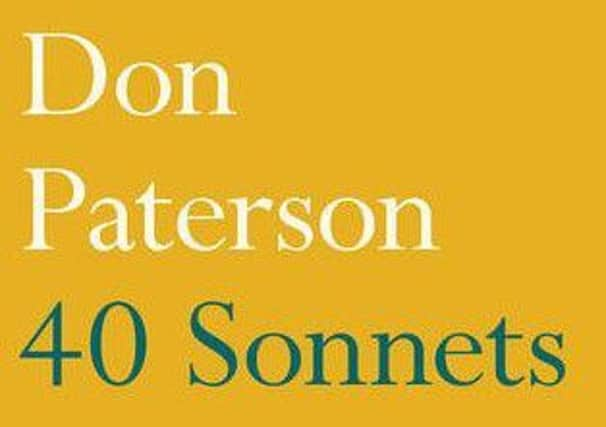Book review: 40 Sonnets by Don Paterson


40 Sonnets
Don Paterson
Faber, 56pp, £14.99
From his earliest collection, Nil Nil, it was obvious that Don Paterson had a tremendous gift for the craft of poetry. Later collections have gravitated more and more towards traditional forms, and he has written an extended, and by turns insightful, poignant and hilarious prose commentary on Shakespeare’s sonnets. So this book has the kind of inevitability associated with a perfect rhyme, as well as the perfect sleight-of-hand whereby you didn’t see the inevitability coming. Amateur poets endstop lines with a cross between a metronome and tinnitus. A poet of genius, like Paterson, makes the chime simultaneously a cadence and a surprise.
Although the book is, as it says in the title, 40 sonnets, it is not a sonnet sequence – don’t expect something like Samuel Daniel’s Delia, let alone Sidney’s Astrophel and Stella or Spenser’s Amoretti. It does have an unexpected family resemblance to Elizabeth Barrett Browning’s Sonnets from the Portuguese, but mainly in its obsessions with the paradoxes of love and death, and the ingenious combination of strict form with a strange insouciance. Rather, this is, to co-opt Wallace Stevens, ‘Forty Ways Of Looking At A Sonnet’. Some of them are similar to the unrhymed sonnet form Robert Lowell used in For Lizzie And Harriet and The Dolphin, with an extra kind of kinship in some pieces looking at contemporary politics (especially ‘The Big Listener’, dedicated to Tony Blair, and the horrific ‘The Foot’, combining found-phrases from a report on a bombing in Gaza, as if poetry has no right to fancify a murderous reality: its opening line is “I have no words so here are the no words”). ‘An Incarnation’, comprised of one side of a phone conversation with a call centre, has the kind of gleeful stretchiness of form I associate with ee cummings.
Advertisement
Hide AdBut there are other experiments in the form. Paterson includes a sonnet written in Scots with one word in each line; a few constructed as seven pairs of lines including one with a haiku-like quality; an antiphon (‘Seven Questions About The Journey’); and a kind of homage to Edwin Morgan’s Emergent Poems in ‘Séance’ – though, typically for Paterson, it doesn’t resolve into a familiar line but blurs around a kind of fractured linguistic static. The tone encompasses the outright satirical – ‘A Scholar’ with the damning lines “before the greater will / all text is dream, and takes on the design / of what was sought there”; a wittily bitter poem about Dundee which rhymes “the f*** away” with “Good luck with the V&A”, and a hilariously sarcastic poem about the lengthy introductions at poetry readings – it begins “O tell us more about your dad” and ends “Anything but read your poem”.
But there is also the gothic, the idyllic, the romantic and the elegiac. At the centre of the book is a glorious prose extravaganza (though with a hidden, sonnety element) that could only have come from the pen of the author of the ‘Alexandrian Library’ trilogy, sneakily supposed to be translated from the work of the non-existent Francois Aussemain, with ‘The Version’. This is, perhaps, after the real Chilean poet and astrophysicist Nicanor Parra, but the presiding spirit is Borges. About “a poem about translation, designed to lose precisely everything in translation”, which may actually combust on being read, it’s a sly and delightful piece about being misunderstood at every level.
Paterson has always been obsessed with metaphysics while being distrustful of anything vaguely woolly and spiritual. This is evident here too, especially in a poem like “Souls” – “But for you, soul, which the body bred in error / like some weird pearl, everything is wrong. / Space is stone, and time a breakneck terror / where you hold to nothing but your own small song” – or the profoundly moving ‘Funeral Prayer’, which has the same tense grace his elegies for Michael Donaghy had: “Today we friends and strangers meet / because our friend is now complete”. Paterson is humanely unsympathetic, and brusquely indulgent as ever. The technical accomplishment is almost the least significant point of the collection. When it is done so well, it, like the ghosts that haunt many of the poems, is literally invisible.
• Don Paterson is at the Edinburgh Books Festival on 20 August